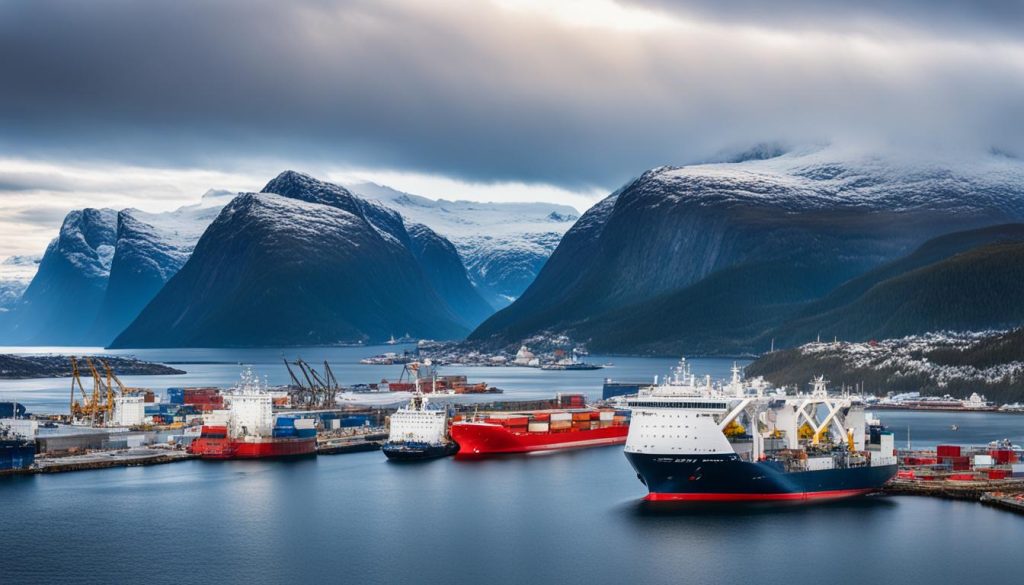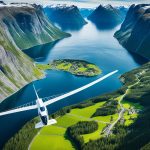“The future belongs to those who prepare for it today.” – Malcolm X
Norway is known for its wealth, with a GDP per person of USD 106,148. It has a small population of 5.5 million spread across a large area. The country thrives thanks to its natural riches like oil, water power, fish, woods, and minerals.
While oil is crucial for Norway, its economy is diverse. It has a big merchant fleet facing the North Atlantic and Barents Sea, making it the world’s 4th largest. Norway’s fair democracy and business morals, similar to the U.S., make it a great model of economic success.
Norway is in the European Economic Area (EEA) but not in the EU. This lets it benefit from the EU market while keeping control over fishing and farming. Thanks to this, Norway enjoys a varied and growing economy.
Key Takeaways
- Norway has a high GDP per capita of USD 106,148.
- The country is rich in natural resources, including petroleum, hydropower, fish, forests, and minerals.
- Norway’s petroleum sector plays a significant role in its economic strengths.
- The nation ranks 4th globally in the value of its merchant shipping fleet.
- Norway’s economic model blends a stable democracy with business ethics similar to those of the U.S.
- Its participation in the EEA allows closer integration into the EU’s single market excluding fisheries and agriculture.
Introduction to Norway’s Economic Landscape
Norway is a shining example of Nordic economic strength. It adds a lot to the region’s wealth, more than USD 1.8 trillion. The country’s GDP benefits from the government taking part in important industries, especially oil.
Norway’s economy is big on oil but also explores other fields. These include fishing, fish farming, eco-friendly tech, and IT. This mix helps Norway stay ahead in the global market.
The government heavily supports key industries, with quite a few state-owned companies. This approach keeps the economy steady. It also sparks new ideas and growth in emerging sectors. As Norway’s economy grows, its readiness to adapt and innovate stands out.
The Energy Sector: Petroleum and Natural Gas
Norway is a major energy supplier to Europe, thanks to its resources. It plays a big role in the oil industry and the natural gas market. These sectors are key to Europe’s energy supply.
Petroleum Industry
The Ekofisk field discovery was a game changer for Norway’s oil sector. By using these oil fields, Norway became very important in energy. It also made a lot of money from petroleum taxes. This money helps keep the country stable and improves living standards.
The industry’s growth boosted engineering skills, especially in Stavanger and Oslo. These skills help Norway grow even more in the energy field.
Natural Gas Market
Norway is the fourth biggest natural gas exporter in the world. Its gas market is crucial for Europe’s energy needs. The country keeps finding and using new gas fields. This makes sure Norway stays a key energy supplier.
Moreover, the expertise in Stavanger has made Norway a global energy leader. This shows Norway’s big role in the world’s energy industry.
Shipping and Maritime Industry
The Norwegian maritime industry is a key part of the nation’s economy. It’s supported by a modern and vast merchant shipping fleet. This fleet is the 4th most valuable in the world. It shows Norway’s top spot in shipbuilding and its progress.
Merchant Shipping Fleet
Norway’s merchant fleet shows how forward-thinking and strong its maritime sector is. It keeps improving, making Norway important globally. It uses the latest technology and excellence in operations.
Offshore Shipping and Shipbuilding
Offshore shipping and shipbuilding are also crucial to Norway’s maritime strength. Despite challenges, Norway has advanced in engineering and ship construction. These efforts have kept it at the forefront of shipbuilding. Stavanger is vital, with its skilled workforce and as a centre for offshore operations.
Thriving Industries in Norway
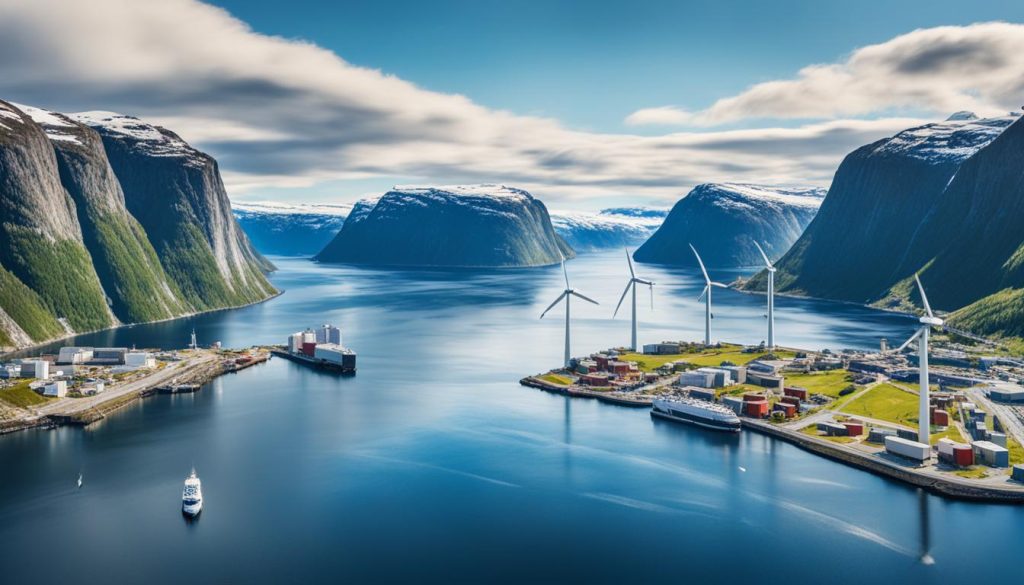
Norway’s economy is famous for more than just oil. It shines in maritime, fishing, and ICT. These sectors play a key role in making the economy diverse and sturdy.
The maritime sector reflects Norway’s industry success. It has a rich history and top-notch infrastructure. This allows it to keep growing and innovating. The fishing industry, using sustainable methods, provides world-class seafood to global markets.
Additionally, the ICT sector shows Norway’s dedication to tech and innovation. This commitment helps the economy stay versatile, less reliant on any one area.
These strong industries highlight Norway’s focus on sustainability and new ideas. Norway’s industrial narrative is a model of economic vigor and vision. These industries together push the nation towards a bright and secure economic future.
Fishing and Aquaculture
The Norwegian fishing sector is vital for the country’s economy. It thrives on cold-water species like herring and cod. Norway’s long-standing seafood export tradition benefits from sustainable practices and strict quality standards.
Fishing Industry
Norway’s marine ecosystem is rich, offering many fish species important for local and global markets. Norwegian seafood is in constant demand, thanks to its excellence. Its fishing industry follows strict rules, ensuring the sustainability of fish stocks.
Aquaculture
Norway leads globally in sustainable fish farming, thanks to innovative aquaculture technology. This sector supports seafood exports and looks to meet the world’s rising fish protein needs. It focuses on efficiency and reducing environmental impacts, with some of the toughest regulations worldwide.
Green Technologies and Renewable Energy
Norway leads in green energy, using its natural landscape for hydroelectric power. It’s a top-notch example of sustainable energy use.
This commitment makes Norway a front-runner in eco-friendly initiatives.
Hydropower
Norway shines in renewable energy due to its focus on hydropower. Its mountains and rivers are perfect for hydroelectricity. This is the main source of their power and showcases their care for the planet.
Emerging Green Technologies
Norway isn’t just about water power; it’s also exploring new green tech. These efforts are pushing their sustainability goals further. They’re into wind, solar, and even carbon capture technologies, aiming to lower their environmental impact. Norway’s push for renewable resources and smart solutions proves its dedication to a healthier planet.
Information and Communication Technologies (ICT)
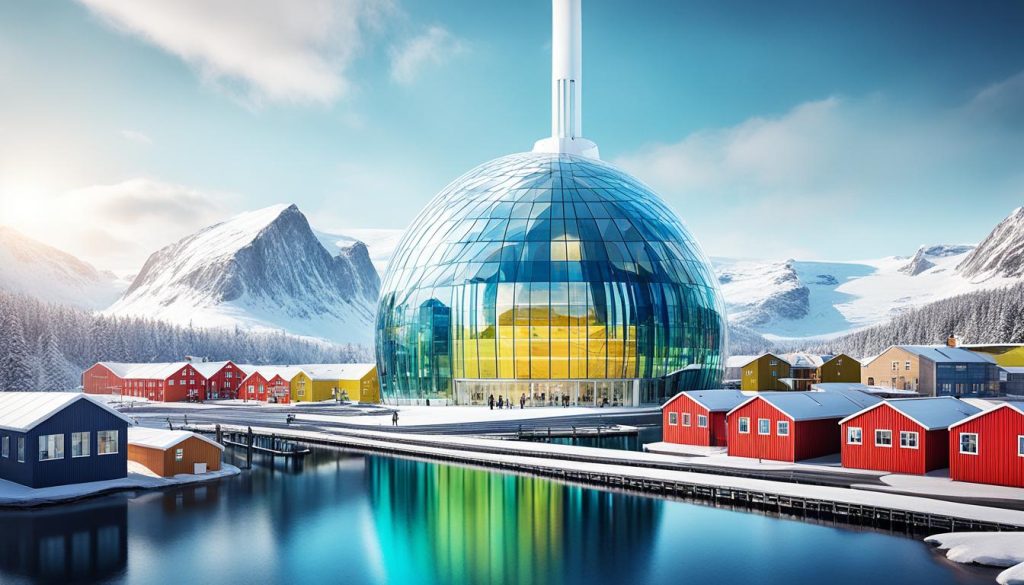
Norway’s ICT sector has grown a lot, thanks to its dedication to digital progress. Its strong digital foundation has helped the ICT sector expand quickly. This ensures good connectivity and new tech all over Norway.
ICT Growth and Development
The ICT scene in Norway keeps changing and growing. The government and private sector investments have been crucial. They have made Norway a leader in using new technologies, encouraging a creative atmosphere.
From new software to advanced telecoms, the ICT sector shows Norway’s commitment to digital leadership. This sets the stage for innovation and progress.
Leading IT Companies
Major Norwegian IT firms are making a big impact, strengthening the sector’s reputation. Telenor, Opera Software, and EVRY have driven tech advancements forward. They work in telecoms, internet services, and business solutions, showing Norway’s ICT diversity.
These companies innovate at home and abroad. This helps Norway be known worldwide for tech excellence.
Minerals and Light Metals
Norway is rich in natural resources, making its mining industry strong. It has valuable minerals and light metals. This puts Norway at the forefront of global mining activities. The country’s geology is ideal for mining and processing these important resources.
Natural Resource Endowment
In Norway, the use of natural resources is very important. The country has minerals like nickel, cobalt, and titanium. These are vital for many industries. Exploring and using these resources wisely helps Norway’s economy grow. It provides materials needed by various sectors.
Industrial Applications
Processing light metals in Norway is key for many industries. Aluminium and magnesium support sectors from aerospace to cars. Norway’s advanced methods improve the quality and efficiency of these metals. They ensure the metals meet international standards. Using natural resources cleverly boosts Norway’s industry and global standing.
The mining and light metals sectors are crucial for Norway. They drive innovation and sustainable growth by wisely using natural resources.
Innovative Manufacturing and Services
Norway’s manufacturing combines modern tech with traditional skills. This blend leads to top-quality production. It keeps Norway ahead in the world market. Norwegian manufacturers use advanced machinery and engineering. They innovate to keep up with a fast-changing world.
The service sector’s innovation also boosts Norway’s economy. Digital tools and new methods enhance services like healthcare and financial consulting. They not only make services better but also open up growth chances across sectors.
Norway’s focus on innovation and diversification keeps its economy strong. It helps the country face global challenges well. This approach ensures Norway remains competitive and progressive. It shows Norway as a leading nation with a strong economic base.
Environmental Sustainability and Economy
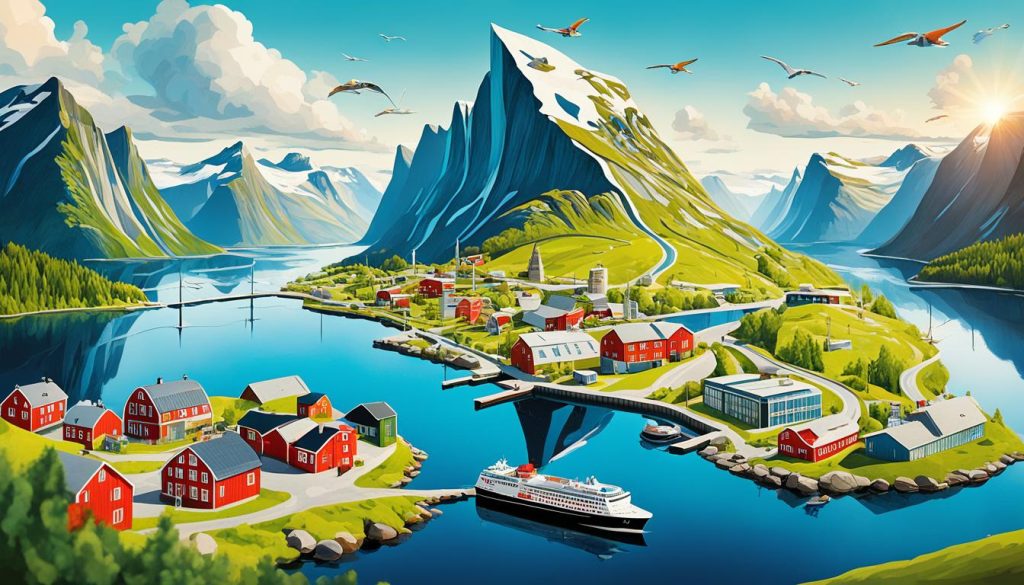
Norway shows the world how to balance economic growth with care for the environment. This balance comes from mixing ecological responsibility into the strategies of both the government and businesses. This creates a strong model for sustainable growth in Norway. The country aims to grow economically while protecting nature. This has led to a system that supports eco-friendly projects.
Sustainable Practices
Norwegian businesses are leading the way in being eco-friendly. They are doing great in sectors like renewable energy, fishing, and farming. These actions show a serious commitment to lessen environmental harm. Norway is also focusing on improving waste management, saving energy, and protecting nature. These steps prove that sustainability in Norway is a core part of the economy. It is not just a policy but a lifestyle.
Government Policies and Support
The Norwegian government is key in supporting eco-friendly efforts. It has policies that help and encourage taking care of the environment. Norway offers help for renewable energy projects and eco-friendly business practices. It also enforces strict rules to decrease carbon emissions. Together, the government and businesses work to build a strong, green economy. This collaboration has made Norway a leader in eco-innovation.
Financial and Banking Sector
Norway’s financial and banking sector is known for being stable and innovative. It has reliable banks that offer many services for individual and business clients. This makes sure financial services are stable. The friendly regulatory environment also attracts investors.
Banking Institutions and Services
Banks in Norway offer a wide range. You can find commercial banks and state-run entities. They offer savings accounts, loans, investments, and insurance. Advanced technology makes banking smooth, building trust with customers.
Investment Opportunities
Norway’s banking sector is great for investment. The country has a stable financial scene with high credit ratings and a strong currency. This attracts investors from both Norway and abroad. You can invest in energy, maritime, technology, and green projects. Norway’s financial services support these opportunities well.
Impact of the Global Economy on Norway
Norway’s economy is heavily influenced by global trends. It has shown great skill in handling the ups and downs of world trade. This skill helps it grow steadily, even when other countries struggle.
The country’s success comes from its clever trading and investment strategies. Norway uses its resources wisely to keep a strong position globally. It stays open to global trade, which brings benefits and reduces risks.
Norway has also invested in different sectors to boost its economy. Its energy and green technologies are just two areas where it excels. These efforts show Norway’s ability to adapt and plan for the future.
By keeping up with world economic trends, Norway avoids many problems. It takes advantage of global market opportunities. As the global economy changes, Norway adjusts its plans. This keeps its economy healthy and its position strong worldwide.
Tourism and Hospitality Industry
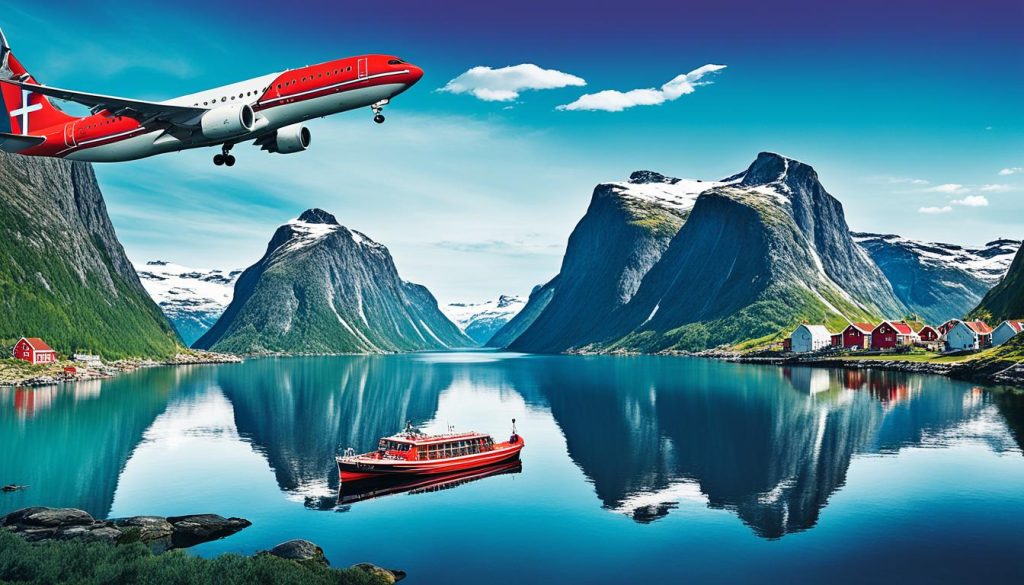
Norway’s tourism and hospitality sector is booming. People from all over the world come to visit. They are drawn by the mix of city life and stunning nature.
Attractions and Destinations
Norway offers many attractions that highlight its history and beautiful scenery. Tourists can visit Oslo to see its culture and architecture. They can also explore peaceful fjords and the spectacular northern lights. Norway is a top spot for eco-friendly travel thanks to its dedication to nature.
Economic Contribution
The tourism sector is a big part of Norway’s economy. It helps Norwegian tourism grow. Tourists support a range of businesses, like hotels, restaurants, and travel agencies. The industry creates jobs and encourages cultural sharing, making it vital for Norway.
Government Role in Economic Development
The government’s role in the economy is key in Norway’s effective economic model. It takes an active and smart approach, focusing on policies that boost various sectors. This ensures growth and stability.
One main strategy is the solid support via state ownership and rules. The Norwegian public sector is central in important areas. These include energy, maritime, and fisheries. It helps these industries grow and compete globally.
To keep the economy strong, the government focuses on important policies. These look at present and future needs. It invests in green tech, improves digital setups, and encourages new ideas. So, the government’s role is seen in its direct actions and in making a good environment for private businesses.
Smart rules and the government’s strategic involvement help the public sector greatly. This approach helps Norway stay strong through global economic changes. It keeps Norway as a leader in the Nordic regions.
Opportunities for Foreign Investment
Norway is great for foreign investment because of its welcoming approach to international capital. It has policies that support economic growth and global trade. This makes Norway a top spot for investors.
Investment-Friendly Environment
Norway stands out for its clear governance, solid legal structure, and political steadiness. These aspects boost investor trust and offer a strong base for foreign investment. Being in the heart of the Nordic area, Norway gives investors a gate to a bigger market. This position makes it appealing for worldwide businesses.
Key Sectors for Investment
The energy, technology, and manufacturing sectors are booming areas for investment. Norway’s focus on renewable energy attracts global investors. Its technology industry is known for innovation and sustainability. Plus, the manufacturing sector gains from high-quality infrastructure and talented workers.
The Norwegian government offers positive tax policies, grants, and financial help to encourage investment. These incentives make Norway an attractive place for global companies looking to grow in Europe.
Conclusion
Norway’s economy shines, blending tradition and innovation. It thrives on various industries like energy, shipping, ICT, and green tech. Each sector drives growth and creativity, making Norway a key global player.
Norway values sustainability in its economic strategy. It shows in their push for green solutions and care for the environment. This approach boosts prosperity now and ensures a promising future for the country.
Norway is also an attractive spot for foreign investors. Its open policies and wealth of resources welcome investment. This mix of innovation, sustainability, and investment potential marks Norway as a resilient and dynamic economy poised for more success.

